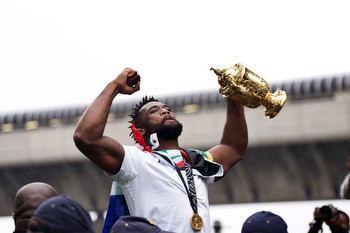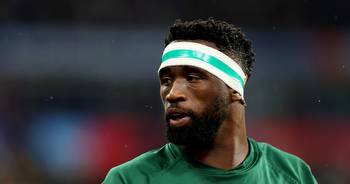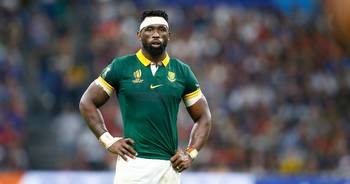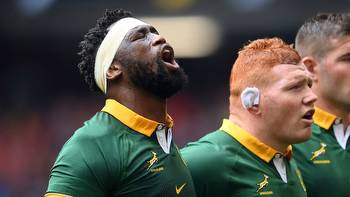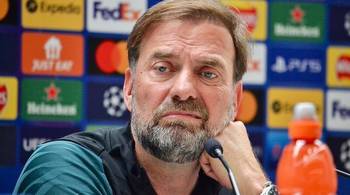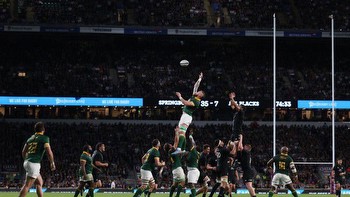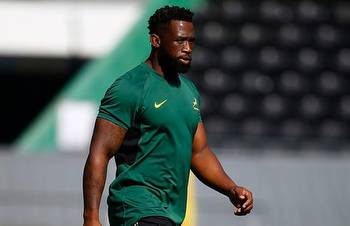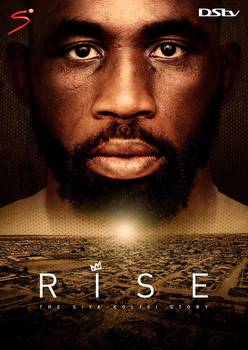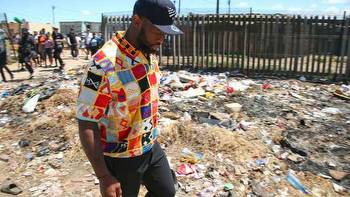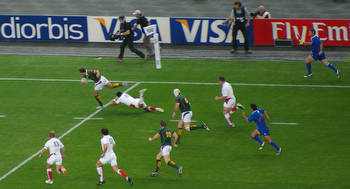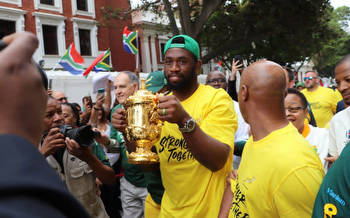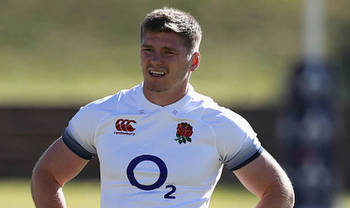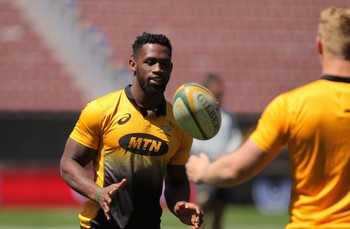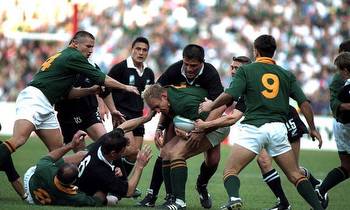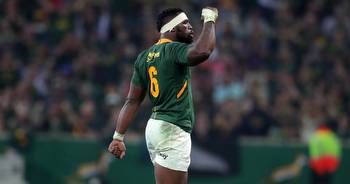Siya Kolisi nearly lost it all in life of booze and strip clubs before wife's intervention helped him become Springbok great
South Africa's Siya Kolisi stands on the verge of history as Saturday night could see him emulate All Blacks legend Richie McCaw by becoming only the second player ever to win back-to-back World Cups as captain.
The 32-year-old will become the most capped Springbok skipper at a World Cup when he leads his side out against New Zealand in the final at the Stade de France on Saturday and will be hoping to emulate the scenes of four years ago, when he lifted the Webb Ellis Cup for the first time in Tokyo.
Not only a world-class player, Kolisi is also one of the most recognised and respected sportsmen on the planet. A leader of men, he has inspired millions around the globe with his actions on and off the pitch and served as a role model to young people looking for a way out of poverty-stricken areas of South Africa.
Such a battle against adversity is something that Kolisi knows all too well having endured a brutal childhood that saw him writhe in pain from hunger most nights and witness death and violence at every turn. He's also battled his own demons on the way to the top of the global game and is now stronger and wiser for the experiences.
As he prepares for another huge battle, here's the remarkable story of how a young boy from Port Elizabeth fought against the odds to become a global icon.
Brutal childhood
Kolisi was born in 1991 in the Zwide Township of Port Elizabeth in the Eastern Cape, just 16 months after Nelson Mandela was released from prison. South Africa was in the process of transitioning out of the Apartheid era where the Springboks jersey once represented institutionalised racial segregation.
Kolisi was raised in poverty by his grandmother in a two-bedroomed house occupied by five people. Much of South Africa at the time was plagued by poverty, malnutrition, crime and substance abuse which affected Kolisi's early life.
"It went past being hungry; it was actually painful in your stomach," he told the BBC. "I could feel my intestines twisting in the middle of the night. I would scream to my grandmother and she would get me sugar water and it would settle it down. A lot of my values come from being resilient. The people from my community might be poor financially but they are happy, proud and resilient people."
Not even 10 years old, Kolisi suffered heartbreak when his grandmother died in his arms. "The one person who’d loved me unconditionally had gone," he wrote in his autobiography. "Without her, Zwide could seem an even scarier place than before".
He was also just 12 when he watched a man being stoned to death, while he witnessed more gender-based violence against his loved ones telling the BBC. "At home, like right next to me while I was sleeping, I'd wake up hearing the screaming of my mum or my aunt. Or I'd be walking to school and seeing someone getting beaten in the middle of the street and no-one doing anything about it because people felt it wasn't their business."
In an interview with the Guardian, Kolisi also spoke about his mum's face changed dramatically from when she gave birth to him aged 18 to when she died 15 years later. “[She was] beautiful and, most of all, unscarred," he said. "I never saw her look like that because her face changed so much from the different men beating her up … when she died she had scars all over her face.”
“After she had passed, I showed [old photos of her] to my younger brother and he said: ‘That looks nothing like her.’ That broke me. But, even through the hurt, she’ll always be beautiful to me.”
However, Kolisi's life changed in 2002 when he joined the local rugby team the African Bombers, and acquired a good role model in head coach Eric Songwiqi. The coach then arranged for him and two other boys from Zwide to join a scholarship at Grey School in Port Elizabeth - a leading white rugby school.
While he could not speak of a word of English when he joined the school - his primary language being isiXhosa. - Kolisi battled against the odds as he began to make a name for himself in the rugby world.
Rise to prominence
His rugby career really took off at Grey where he made the Eastern Province provincial team while also representing the South African schools side. Kolisi got picked up by the prestigious Western Province Rugby Institute in Stellenbosch where he would eventually earn the right to play in the Currie Cup.
He then played for South Africa U20s, and such was his potential he made his Super Rugby debut for the Stormers in 2011 as a replacement for Springbok legend Schalk Burger who was ill at the time. The abrasive back-rower made such a mark he was called into the Springboks squad for the first time in 2013 and put in a man on the match
Hiis real breakthrough came in 2017 when he was one of the shining lights in what was arguably the worst campaign in the Springboks' history. The Springboks then parted ways with head coach Allister Coetzee, replacing him with the well-respected Rassie Erasmus who wasted no time in naming Kolisi captain.
This was to be a significant turning point for Kolisi, with South Africa rising like a phoenix from the ashes to lift the Webb-Ellis Cup in 2019 with him at the helm. But just months earlier, the skipper had been lost in a world of 'sin' which threatened to take away everything he had worked for.
Alcoholism and strip clubs
Kolisi's career as a professional rugby player hasn't been all plain sailing as he faced no shortage of off-field personal issues including a long-standing battle with alcohol.
Having started drinking aged just 10, Kolisi documented in his autobiography Rise Kolisi how his alcoholism very nearly cost him his family as he struggled to cope with not being a regular starter in the Springboks team during the 2015 World Cup.
"Whenever I had time off, I just drank," he wrote. "I was bored and feeling sorry for myself, there were other guys around in the same boat who were always happy to hang out, and it was all too easy for me to hit the bars and pubs and be a good-time guy.
"Rachel [my wife] had come out with baby Nick, and this would have been the perfect opportunity to spend some time with them; but no, I preferred to be out with the boys. It was an awful time for her, and I was too selfish to realise. In the end Rachel got fed up with me being a jerk and flew home a week early.
"The trajectory of my life was bad. I had to stop behaving like this or else I'd lose my family. It wasn't 'stop drinking', because drinking would have been fine if I'd just had a couple of beers and stopped there. It was 'stop drinking until you're obliterated, each and every time'.
"Because that's what I was. Whenever I opened a drink it was as though there was a message at the bottom of the bottle saying 'drink me, keep on going'. I'd binge and not remember what had happened the night before."
In his interview with the Guardian, he added that his troubled upbringing had led him to try and find an escape in the form of strip clubs, watching pornography and binge drinking, describe himself as a sinner rather than a saint.
“Let’s say I’m someone’s role model," he said. "The kid will think: ‘I want to be like you one day.’ But he doesn’t know the struggles you face. No one tells him there’s temptation – alcohol, drugs, all these things are available to you.
“I wish I’d had a mentor that told me you’re going to face these challenges and you must be prepared to fight them. I had to go through the hard way. Now I want to make sure the next kid and his family can read the book and think: ‘How will we prevent that? How will we prepare you for that kind of life?’
“Some people also know how I was in the past and I’m not a saint at all," he added. "I’m a sinner trying to be the best he can be every day. I drank when I was happy or sad, or dealing with something. Drinking was the only way I knew to get through this stuff.”
However, he was saved from his downward trajectory just months ahead of the glorious 2019 World Cup campaign when his wife intervened and persuaded him to find a Christian mentor, who Kolisi says "exposed my sin". Recounting what he was told, Kolisi said:"[He said] Siya, you drink a lot, you fool around with women, you go to strip clubs. You post on social media about your faith in Christ, but you’re lying to yourself and everyone else.”
“I started opening up to him and we spoke deeply. He told me I needed to stop drinking. It was tough at the beginning but now I don’t miss it.”
Fighting prejudice
Despite not speaking a word of English until nearly a teenager, Kolisi has become one of sport's greatest orators and frequently makes headlines with his powerful speeches and press conference answers, as well as his kind gestures to teammates and opponents.
He is also a great believer in using his own experiences to help make the world a better place and feels very strongly about putting an end to issues including gender-based violence and racial prejudice.
Growing up in a country filled with racial tension, Kolisi knows all about racism and the horrible effects it can have on people and society as a whole. His appointment as the Springboks' first black captain was a seminal moment in the history of South African rugby on a par with Francois Pienaar lifting the Webb-Ellis Cup alongside Mandela in 1995.
Kolisi has even experienced racism since becoming a Springbok with his wife, Rachel, who is white, also a victim. "That stuff should be addressed," he told the BBC. "People say you should take the good and the bad. No, I would rather have none of them.
"There's some stuff you can't handle. You shouldn't be getting that kind of hate. Everyone can have their opinions but can keep it to themselves. People should stand up a bit more. We work hard every day. You're not always going to win everything or perform.
"The social media groups should protect athletes and cut people off. When people do a horrible job in their work, no one gets to say those things to them."

